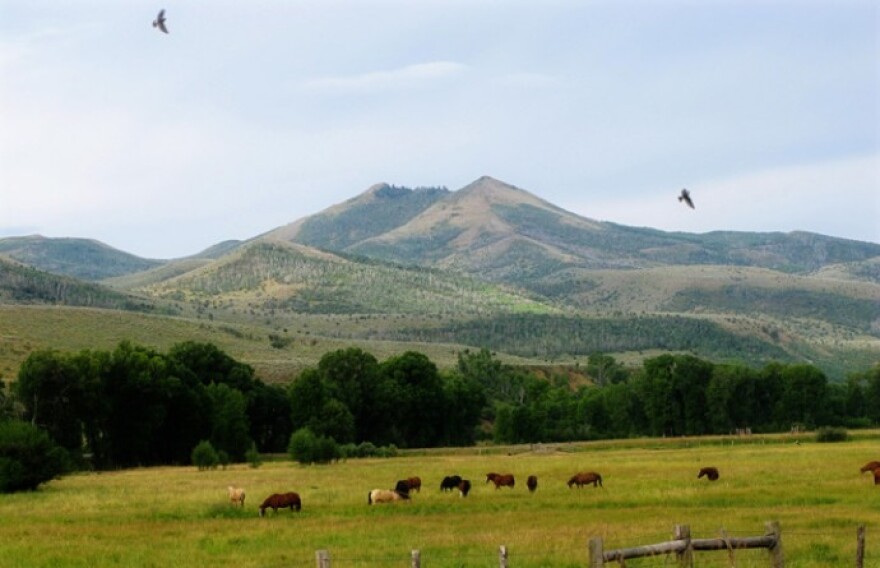Real estate brokers across Wyoming and the west have been seeing more and more people buying ranches for investment purposes. In many cases, that’s changing the way the ranches function and affecting the communities around them. Wyoming Public Radio’s Willow Belden reports.
WILLOW BELDEN: Art Sigel is a retired chemical engineer from Chicago. Well, sort of retired. He’s no longer a chemical engineer. But now he and his wife own and operate a ranch in southeast Wyoming.
ART SIGEL: I’ve always had a love of the West, and … when I retired in 2005, we decided to locate in the West. … And we found this ranch after searching near and far, and so that’s kind of how we settled here.
BELDEN: The ranch is nestled at the foot of the Snowy Range. Grassy fields give way to sage brush-covered slopes and aspen groves. Sigel runs yearlings on the ranch … and he says he loves the work, and the lifestyle. Several of his children, and now grandchildren, live on the ranch too.
SIGEL: We hope that it will stay in the family for many generations to come and the family will, in one way or another, enjoy it as we do.
BELDEN: Sigel is one of many people from out of state who have made their money elsewhere, and are now buying ranch real estate in Wyoming. But he’s a little different than most. B. Elfland is a broker with Fay Ranches, a real estate firm that sells ranch property in Wyoming and neighboring states. Elfland says unlike Sigel, most buyers don’t actually live on the ranches, or do the work themselves.
B ELFLAND: Typically they are a seasonal destination, and they typically employ people as ranch managers and a variety of other levels of help.
BELDEN: Elfland says they buy the ranches because they want a safe place to park some of their money. And he says a ranch is a valuable addition to almost any investment portfolio.
ELFLAND: It would be hard for anyone to convince me that there’s a better investment out there than land.
BELDEN: That’s because real estate is more stable than, say, the stock market.
JAMES RINEHART: But they don’t look at it, necessarily, as a property that’s going to give them a return on investment, or an immediate return on investment.
BELDEN: That’s James Rinehart, the Laramie real estate agent who handled the sale of Art Sigel’s ranch. He says buying a ranch is not a way to get rich quick. Many of his clients, like Sigel, buy these ranches for the lifestyle they offer. For the hunting and fishing opportunities. For a chance to leave the city behind, and own a piece of wide open space.
But whatever the motivations of the buyers, Rinehart says the change in land ownership can affect local communities.
RINEHART: These ranches – they’re not the family ranches anymore. … It changes the whole dynamic of the local ranchers.
BELDEN: Rinehart says the changes can bring economic benefits to a community. But there are also costs. For example, in many cases, there are no kids on the ranches anymore.
RINEHART: Some of the schools will not have as good of enrollment, so you’re going to see some of the schools closing. You’re going to see situations where you don’t have the family dynamics on each one of the ranches. … Now some of the owners will hire some families, but it’s been hard to do, and it’s hard to see them move forward with that.
BELDEN: And there’s a bigger problem. Brett Moline with the Wyoming Farm Bureau Federation says wealthy buyers are driving up land prices, so much so that ranchers can’t afford to buy ranchland anymore.
BRETT MOLINE: It’s harder for locals to be able to purchase land to either start an operation or to expand their current operation. It’s selling for prices that are much higher than what the agricultural enterprises will support.
BELDEN: Moline says that has not led to a major decrease in the productivity of Wyoming’s ranches. But it does make it very tough for aspiring ranchers to get a foot in the door. They can find jobs as ranch hands, but they can’t start their own operation.
Chris Bastian is a professor of agricultural and applied economics at the University of Wyoming. He says agricultural land prices have been rising for decades. And part of the reason is because land values are no longer based solely on how productive the land is. Instead, they’re also based on things like pretty views, and good fishing opportunities.
CHRIS BASTIAN: We’re seeing more people with nonagricultural interests purchasing agricultural properties. And they’re willing to pay for these amenities beyond agricultural productivity.
BELDEN: And Bastian says as the rich get richer, and more people own second homes, the trend is likely to grow. For Wyoming Public Radio, I’m Willow Belden.







